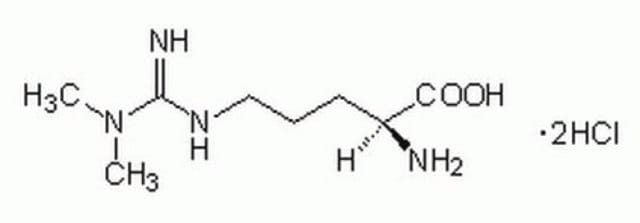SMB00938
Dimethyl-L-arginine
≥95% (HPLC)
Synonym(s):
Dimethyl-L-arginine, (S)-2-Amino-5-(3,3-dimethylguanidino)pentanoic acid, Asymmetric dimethylarginine
About This Item
Recommended Products
Quality Level
Assay
≥95% (HPLC)
form
powder
color
off-white
storage temp.
room temp
InChI
1S/C8H18N4O2/c1-12(2)8(10)11-5-3-4-6(9)7(13)14/h6H,3-5,9H2,1-2H3,(H2,10,11)(H,13,14)/t6-/m0/s1
InChI key
YDGMGEXADBMOMJ-LURJTMIESA-N
General description
Application
Features and Benefits
- Ideal for biochemical and metabolomics studies
- High purity product for research applications
Other Notes
Storage Class Code
11 - Combustible Solids
WGK
WGK 3
Flash Point(F)
Not applicable
Flash Point(C)
Not applicable
Choose from one of the most recent versions:
Certificates of Analysis (COA)
Don't see the Right Version?
If you require a particular version, you can look up a specific certificate by the Lot or Batch number.
Already Own This Product?
Find documentation for the products that you have recently purchased in the Document Library.
Our team of scientists has experience in all areas of research including Life Science, Material Science, Chemical Synthesis, Chromatography, Analytical and many others.
Contact Technical Service







